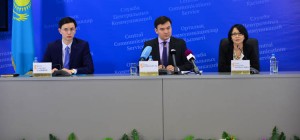 ASTANA – The Kazakh language is being tested as part of Google’s translation service thanks in part to the efforts of Beeline Kazakhstan and WikiBilim Public Fund.
ASTANA – The Kazakh language is being tested as part of Google’s translation service thanks in part to the efforts of Beeline Kazakhstan and WikiBilim Public Fund.
Rauan Kenzhekhanuly, Chair of the Board of Trustees of WikiBilim Public Fund, said that including Kazakh in the Google translate system will be an important step in the language’s development. Kenzhekhanuly spoke at the Central Communications Service (CCS) briefing held on Dec. 24.
“We began thinking about it about one and a half years ago. We started to think about how to add the Kazakh language to the translation system. We reached out to the Google company on this issue. Representatives of the company and the team that is engaged in developing the Google translate service said that there needed to be a lot of mirror translations from Kazakh into English and vice versa in order to do this,” Kenzhekhanuly said. Beeline Kazakhstan joined the project and together they managed to provide enough mirror translations for adding the language to the Google translate service, he said.
“Recently, Google announced that the trial version of translations from English into Kazakh and vice versa was ready, which requires us—users of the Kazakh language—to evaluate the work of the service,” he said.
According to Kenzhekhanuly, Google translate includes 80 languages at the moment.
“It happens that machines make mistakes. … Nevertheless, these systems have been actively developing for the last 20 years. The quality of translation in some languages is quite high. … For example, in English and French languages, the quality of translation is high and almost doesn’t need any revising,” he said.
“The quality of the translation is not 100 percent yet, but it is enough to understand the context and idea of any text. Moreover, these systems develop by means of our active participation. For example, if you see a mistake, you can correct it and the machine will remember it,” he added.
He also noted that the Kazakh language’s expected switch from the Cyrillic to the Latin alphabet would not cause any problems for Kazakh Wikipedia or the new translation service. Digital technologies mean texts made with one graphical system can easily be converted to the other, Kenzhekhanuly said. “If this decision is made, both Wikipedia and texts translated via Google translate can easily be available in a new alphabet.”
“In such projects as Kazakh Wikipedia or Google translate, we could test the first version of transliteration from Cyrillic into the Latin alphabet,” he added.
Public Relations Manager of Social Projects of Beeline Kazakhstan Anar Zhumagulova spoke about the work involved in introducing Kazakh into the Google translate service.
“First of all, we provided free access to our service. We needed a lot of people involved in this process, preferably those fluent in Kazakh and English, for expanding the language base. But this was in the first stage, when everyone could access it using smartphones and input texts in Kazakh or English,” she said.
“The second stage required an assessment process for those who would like to use this service in the future and have a high quality translation. We need to understand how good the translations are,” she said.
